Future Faith: Ten Challenges Reshaping Christianity in the 21st Century by Wesley Granberg-Michaelson (Fortress Press) regularly $18.99; our sale price = $16.99
To order from Heart & Minds, an independent bookstore in Dallastown, PA, please use the order form link at the end of this column. Use the inquire link if you have questions. We’re happy to help and hope to serve you well.
As May moves into June every year in recent years we’ve had a string of bookselling events that are demanding but stimulating, hard but rewarding. These events remind us of the joys and sorrows, the strengths and weaknesses, the glories and the foibles, of our mainline denominational churches; last week we set up huge displays for an annual Synod Assembly of the Evangelical Lutheran Church in America (ELCA), and then, right after that exhausting  tear down and load out, we zoomed to an ecumenical conference at Lancaster Theological Seminary on “Mercersburg Theology” (a 19th century German Reformed tradition that was significant and remains a curious influence in central Pennsylvania United Church of Christ (UCC.) This year, alongside academic papers on Nevin and Schaff (the founders of the “Mercersburg school”) there were Orthodox theologians, a graduate of Westminster Seminary, a Mennonite presenter and an Episcopalian scholar who studied at the Presbyterian seminary in Pittsburgh and works for the Eastern Rite Catholic Seminary in Pittsburgh. (Did you know there were Catholics who are Eastern?) What a world, so many scooped up in the big net of God’s saving catch.
tear down and load out, we zoomed to an ecumenical conference at Lancaster Theological Seminary on “Mercersburg Theology” (a 19th century German Reformed tradition that was significant and remains a curious influence in central Pennsylvania United Church of Christ (UCC.) This year, alongside academic papers on Nevin and Schaff (the founders of the “Mercersburg school”) there were Orthodox theologians, a graduate of Westminster Seminary, a Mennonite presenter and an Episcopalian scholar who studied at the Presbyterian seminary in Pittsburgh and works for the Eastern Rite Catholic Seminary in Pittsburgh. (Did you know there were Catholics who are Eastern?) What a world, so many scooped up in the big net of God’s saving catch.
Next we spend a whole day out of town setting up for a several day gathering of the Central Penn Conference of the UCCs. Not only do they allow me to do a workshop and highlight books from up front, they really appreciate our mix of books both evangelical and progressive, mainline and missional, contemplative and social action oriented all alongside those about spiritual renewal and congregational revitalization.
As you know, we often write here about the relationship of faith and work, careers and callings, what it means and what it looks like to think Christianly and live faithfully in every area of life in this broken, wonderful world. Although our bookstore enjoys selling books about art and science, work and play, sex and politics, food and farming, psychology and business, in fact, many of our most enjoyable off-site events are clergy retreats or events of denominations who are gathered in their judicatories for enrichment and renewal and denominational business. It’s an honor to get to serve these mainstays of our religious landscape – Lutherans and Episcopalians and United Methodists and Presbyterians and Brethren and more. Thank you one and all for allowing us into your work..
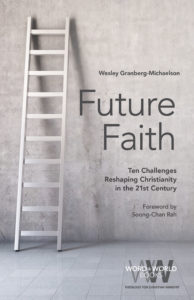 Which brings us to one of the very best books about church life I’ve read in ages, an important and interesting and insightful work by one of the most interesting, ecumenical, globally-connected persons you could ever meet, Wesley Granberg-Michaelson. The book, recently published by Fortress, is called Future Faith: Ten Challenges Reshaping Christianity in the 21st Century.
Which brings us to one of the very best books about church life I’ve read in ages, an important and interesting and insightful work by one of the most interesting, ecumenical, globally-connected persons you could ever meet, Wesley Granberg-Michaelson. The book, recently published by Fortress, is called Future Faith: Ten Challenges Reshaping Christianity in the 21st Century.
Future Faith is both a “big picture” book from a bird’s eye view and yet also offers some very specific stuff or ordinary congregations (include well designed conversation questions for those who want to use the book in an adult ed class or book club.) Mainline folks really need it – Wes, as I’ll explain, has been deeply involved in ecumenical conversations as the General Secretary of the Reformed Church in America and has served a variety of global ecumenical organizations like the WCC – but those who attend evangelical community churches, missional faith communities, or mega-churches of all sorts will also benefit.
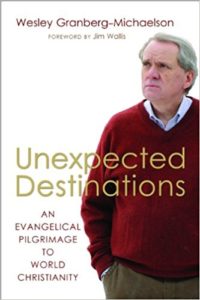
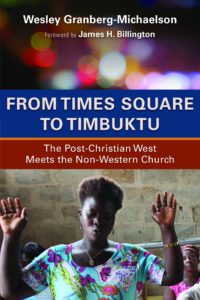 And, by the way, he is an ideal author to reach both mainline folk and evangelicals. As Wes tells so pleasantly in his fascinating memoir, Unexpected Destinations: An Evangelical Pilgrimage to World Christianity [Eerdmans; $24.00] he grew up on the fundamentalist side of the pew but his journey has taken him into nearly every corner of the broader Body of Christ. As he develops then in his 2013 masterpiece, From Times Square to Timbuktu: The Post-Christian West Meets the Non-Western Church (Eerdmans; $20.00) the realities of the global church — well known from all the recent books with all the statistics that indicate the majority of Christians (for the first time in 2000 years) are now in the global South and Asia and not white, European or North American – are now coming through migration and immigration, to our own towns. That is, even as world Christianity’s center of gravity has moved to some point near Timbuktu, many of these brothers and sisters are, in fact, moving to North America, bringing their experiences and theological frameworks with them.
And, by the way, he is an ideal author to reach both mainline folk and evangelicals. As Wes tells so pleasantly in his fascinating memoir, Unexpected Destinations: An Evangelical Pilgrimage to World Christianity [Eerdmans; $24.00] he grew up on the fundamentalist side of the pew but his journey has taken him into nearly every corner of the broader Body of Christ. As he develops then in his 2013 masterpiece, From Times Square to Timbuktu: The Post-Christian West Meets the Non-Western Church (Eerdmans; $20.00) the realities of the global church — well known from all the recent books with all the statistics that indicate the majority of Christians (for the first time in 2000 years) are now in the global South and Asia and not white, European or North American – are now coming through migration and immigration, to our own towns. That is, even as world Christianity’s center of gravity has moved to some point near Timbuktu, many of these brothers and sisters are, in fact, moving to North America, bringing their experiences and theological frameworks with them.
(Here in little ‘ol Dallastown in south-central PA, there is a sizable weekly worship assembly of Egyptian Coptic Christians that mean in a United Methodist sanctuary, now furnished with art and icons of Mary and John and other ancient Greek and Coptic saints. We visited with them a bit during their food festival last weekend – yum! It was so nice having these dear Egyptian Christian friends show Beth and Debi their iconostasis and worship space.)
Anyway, Wes is as fluent in Coptic or Pentecostal faith traditions as he is talking about his own background with an extended family that was friends with the Billy Graham family; he and his wife were leaders at the social justice-oriented Sojourners for a while, even as he grew to become the head of a major Reformed denomination. Through it all, as one reviewer put it, Wes’s “thoughtful, curious, and pastoral heart shines through.” We all need this book, and he’s perfectly situation to be our guide.
Listen to what Richard Rohr says about him:
Few people have the rare combination of experience, courage, research skills, and humility to say all that Wes offers us here.
I enjoyed Future Faith very much, nodding and underlining and smiling and pondering and I can’t easily tell you just how significant it is. Its format is simple, its writing clear, even though the content is complex. Every chapter presents a key topic, explained as an urgent challenge for the church that must be grappled with, and in each, Granberg-Michaelson offers expert summary of recent data, quotes just the right researchers and books, and delightfully tells stories of his own involvement in this particular issue; what he’s seen and heard or done himself. Ten challenges, one each in ten chapters. There’s a lot of content but not too much. You can do this! We can’t not do this!

Wes has met (and enjoys) people all over the world; it’s remarkable the people he knows! He has visited and consulted with nearly every kind of church (big and small, Western and international, mainline and progressive and evangelical and charismatic, mostly Protestant, but also Catholic and Orthodox. He understands much that goes on in various sorts of faith traditions and has worshipped in places as different as a small storefront to the world’s largest church pavilion – there is one in Africa that stretches more than a mile! (He jokingly says, “I’m not making this up.”) I don’t know anybody who is on a first name basis and tells about his friendships with Spirit-filled mega-church leaders in Korea and social justice activists in South Africa and First Nation theologians in the US and regularly worships in Lutheran and Reformed and even Pentecostal churches, from Grand Rapids to Zurich to Kampala to Santa Fe. Man, this dude gets around!
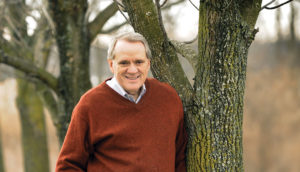 He sees the good, the bad, and the ugly, in the church these days and remains hopeful. The book is hard-hitting and challenging (not least for Western church folks who are the primary intended readers) but it isn’t strident or pessimistic or alarmist. Well, it’s a little alarming since, well, we simply can’t abide the status quo much longer; things must change in our faith communities. The gloomy statistics about church decline and the disastrous trajectory for many aging and dying congregations are self-evident and it is foolish to disregard the writing on the wall, as they say. Granberg-Michaelson clearly summarizes some of the most recent data on this hard stuff and it was both bracing and helpful.
He sees the good, the bad, and the ugly, in the church these days and remains hopeful. The book is hard-hitting and challenging (not least for Western church folks who are the primary intended readers) but it isn’t strident or pessimistic or alarmist. Well, it’s a little alarming since, well, we simply can’t abide the status quo much longer; things must change in our faith communities. The gloomy statistics about church decline and the disastrous trajectory for many aging and dying congregations are self-evident and it is foolish to disregard the writing on the wall, as they say. Granberg-Michaelson clearly summarizes some of the most recent data on this hard stuff and it was both bracing and helpful.
Still, the book is called Future Faith and it is about, as the subtitle makes clear, how faith is being re-shaped now so it can last into the future and how it must change now in order to be sustainable and move with fidelity into this new era.
Know this: Wesley Granberg-Michaelson is not merely saying that the times they are a-changin’ and we have to change our ways to keep up. His plea is not about cultural accommodation or allowing the world to set the agenda for the church. Of course there are theological and missional principles that help us embody faith in ways that are consonant with the cultures in which we find ourselves and we certainly do attempt to stay current in plenty of ways (nobody disagrees with that in many practical matters, except maybe some ancient monks and the Amish) but this book isn’t about adapting to changing times or being relevant, let alone selling out to please people. No, no. These challenges, these chapters, which have sociological and cultural aspects and are increasingly pressing us in this 21st century culture, are, in my reading, fundamentally theological in nature. This isn’t about accommodating to the secular culture or appeasing the world but is about hearing afresh what God’s ways are really all about. These challenges aren’t mere obstacles to survival or topics about which we must relevant but they are windows to the world of faithfulness, opportunities for fidelity, issues that offer us insights into repentance and new life. Perhaps we need to hear Isaiah 43:19.
“Behold, I am doing a new thing!” God says. “Do you not perceive it?”
This book by one of God’s special servants in our generation will help us perceive it.
Future Faith is rooted in global storytelling and sociological future-casting and, yes, has plenty of insight about mega-trends and such. But what is so compelling is that as Wes introduces us to congregations and Christian leaders and renewal movements from all over the world, we hear what God is doing, we learn to be open to the winds of the Spirit blowing, we engage anew Biblical texts and theological truisms. We get in on that “new thing.” Again, the “ten challenges” are less sociological tends as they are huge theological insights.
Diana Butler Bass invites us to read this and says, wisely:
“Listen for the call of the Spirit in these stories. Be not afraid. Embrace this moment of transformation.”
Although not everyone uses the word “worldview,” Future Faith: Ten Challenges… is a foundational resource for the development of what some call a “Christian world-and-life-view.” It helps us see and lean into life in a consistently Christian way, refining and reforming our assumptions and values and expectations; stuff we take for granted. That is, Future Faith will alter your (our) world, transform your (our) social imaginaries (to use Charles Taylor’s word, as Wes does) reforming how you (we) see and make meaning of life and times around us and the meaning of discipleship and our view of the church. Beth and I have said for years that we stock here at Hearts & Minds books of cultural criticism and social analysis and have a whole section we call “Christian worldview” for this very reason – so many of our assumptions about life and times, about all things, should be refined/re-construed to be more theologically and spiritually sound. This book will help, even though it is aimed at church leaders and is mostly about congregational life. It’s fabulous, vital, profound, if foundational stuff, for sure.
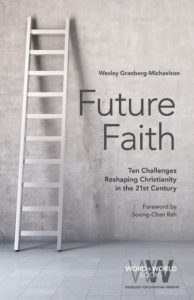 Future Faith will help churches re-vamp their way of doing life together in their parishes, sure, which will help them practically be more sustainable in these changing times, but more importantly, it will help them be more Biblical. More faithful, more coherent and consistent and natural at bearing witness to the very good gospel of God’s Kingdom. Reading and discussing it will transfigure the church and transform us, hopefully making a difference in the world. This is an interesting book about global trends and includes some data and research and predictions but truly it is a book about theological principles which are too often missed and which simply must be embraced, now, before it is too late.
Future Faith will help churches re-vamp their way of doing life together in their parishes, sure, which will help them practically be more sustainable in these changing times, but more importantly, it will help them be more Biblical. More faithful, more coherent and consistent and natural at bearing witness to the very good gospel of God’s Kingdom. Reading and discussing it will transfigure the church and transform us, hopefully making a difference in the world. This is an interesting book about global trends and includes some data and research and predictions but truly it is a book about theological principles which are too often missed and which simply must be embraced, now, before it is too late.
Sorry to get preachy about this. To be clear, Future Faith is a book about church and it is a book about life. It draws on data and trends but is rooted in Granberg-Michaelson’s considerable travels and offers stories and illustrations to help us do church better and understand God’s Kingdom more fully.
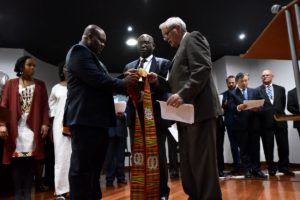 The stories he tells are often about churches from all over – some international, some from North America, many mainline, some not. Wes has this extraordinary calling and exceptional grace to be able to be in fellowship with and learn from folks from all over the theological spectrum so there are plenty of cool stories and lots of provocative insights and some jaw-dropping stories offered. Did I say this would make a great study for a small group or book club?
The stories he tells are often about churches from all over – some international, some from North America, many mainline, some not. Wes has this extraordinary calling and exceptional grace to be able to be in fellowship with and learn from folks from all over the theological spectrum so there are plenty of cool stories and lots of provocative insights and some jaw-dropping stories offered. Did I say this would make a great study for a small group or book club?
Here are the chapters. I could tell you more about each (and, on occasion, a few things I wish might have been put differently or nuanced a bit.) I’d love to ask him questions, or being in a group studying this myself. There’s so much to consider and it is all so interesting and feels so very timely. Here are the Big Ten; each one is well worth reading and, yes, urgent.
- Challenge One: Revitalizing Withering Congregations
- Challenge Two: Embracing the Color of the Future
- Challenge Three: Seeing through Non-Western Eyes
- Challenge Four: Perceiving the World as Sacred
- Challenge Five: Affirming Spirit-Filled Communities
- Challenge Six: Rejecting the Heresy of Individualism
- Challenge Seven: De-Americanizing the Gospel
- Challenge Eight: Defeating Divisive Culture Wars
- Challenge Nine: Belonging before Believing
- Challenge Ten: Saving This World

The forward to this marvelously stimulating and exceedingly important volume is by the great writer and activist Soon Chan Rah (I hope you know his books.) It’s a lovely introduction and he calls Granberg-Michaelson “a voice of integrity.” Nice, huh?
In one of the chapters Wes tells of studying – before he became a congressional aid in the mid 70’s serving with one of my life-long heroes and mentors, anti-war Republican Senator Mark Hatfield –at Princeton Theological Seminary, reading Thomas Kuhn and his seminal work Structures of Scientific Revolution (a book another one of my mentors, the colorful Dutch reformational philosopher Peter J. Steen has us his students in Western Pennsylvania reading in the mid-70s.) It warmed my heart to hear Wes explain what is meant by a paradigm shift (and how Kuhn introduced it to the popular parlance) and how certain large shifts in how we perceive thing can change everything in a culture. I mentioned that Future Faith: Ten Challenges, as much as it is a lively book for congregations needing to retool and revitalize, is also a worldview-shaping book. Whether you are a church leader or not, these ten challenges and his Biblical response to them, will rock your world(view) and will help transform you and, hopefully, your church, into the Kingdom agents God wants the church to be. These aren’t just any ten challenges, pet peeves of Granberg-Michaelson or things that come up from the sociological data. These are holy, Biblical, deeply, deeply important matters, essential to any proper formulation of the gospel, vital for us to wrap our hearts and minds around if we are going to be Biblical people.
Read these endorsements and see if they might inspire you to place an order today. I hope you do.
“This is an extraordinary book – about the hopeful future of the global church and whether the American church wants to be part of that. It demonstrates that we are at a linchpin in Christian history. After hundreds of years of the church’s domination by white Western culture, the majority of Christians are now people of color in the global south. Their theology and lived faith is fundamentally different than the narcissistic American bubble of church that is less and less relevant to its society, gets less and less interest from young people, and has less and less members in its churches. But here is the good news, the global body of Christ is the most racially and culturally diverse human community on the face of the planet. And their Christian witness could literally transform the American churches if we were to listen to them. Wes Granberg-Michaelson offers us ten fundamental ways the global church could help save the American church.”
Rev. Jim Wallis | President and Founder, Sojourners
“Few guides to the future of faith are as trustworthy as Wesley Granberg-Michaelson. This book is filled with wisdom drawn from a lifetime of experience and a heart of passion for the love and justice proclaimed by Jesus. Think of these ten challenges as an invitation to a more faithful way of being church. Listen for the call of the Spirit in these stories. Be not afraid. Embrace this moment of transformation.”
Diana Butler Bass | author of Grateful: The Transformative Power of Giving Thanks
“Few people have the rare combination of experience, courage, research skills, and humility to say all that Wes offers us here. He is sure to console everybody and upset a few folks too. Among many other good things, he recognizes what our individualistic society no longer does. We need to be involved in mediating, mid-level institutions, to make any sustained difference in our world. The lone person might feel enlightened and holy, but they have limited effect on those around him–until they connect. Keep us connecting, Wes!” Richard Rohr, O.F.M. | Center for Action and Contemplation
“Future Faith is a wonderfully informative book about big changes that are happening in the life and mission of the church–with more changes to come! But this is also an inspiring and encouraging book, with wise and inspiring insights into what we can and must do to remain faithful to God’s work of renewal in the world. Future Faith disturbed me as it informed me. But, thank God, it also gave me new hope!
Richard Mouw | President Emeritus, Fuller Seminary
“The forces shaping world Christianity are multi-racial, multi-cultural and non-Western. Future Faith presents them in highly readable chapters spanning every major short and long-term trend. While the scope and content offer something for everyone, for white Christianity in the U. S., whether evangelical or (formerly) mainline, Future Faith is simply mandatory. Take, learn, discuss, and make plans.”
Larry Rasmussen | Union Theological Seminary
“Future Faith is a prophetic call to U.S. churches not only to survive but also thrive, by consistently challenging the readers to look beyond their immediate horizons, geographically and ecclesiastically, to grasp racial developments through the creative and sometimes unfamiliar work of the Holy Spirit.” Wonsuk Ma | Oral Roberts University
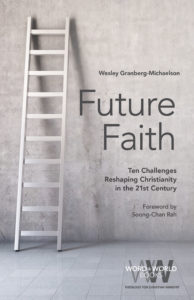
on sale BookNotes price $16.99
BookNotes

SPECIAL
DISCOUNT
ANY OTHER ITEM MENTIONED
10% Off
order here
this takes you to the secure Hearts & Minds order form page
just tell us what you want
inquire here
if you have questions or need more information
just ask us what you want to know
Hearts & Minds 234 East Main Street Dallastown PA 17313
read@heartsandmindsbooks.com
717-246-3333
